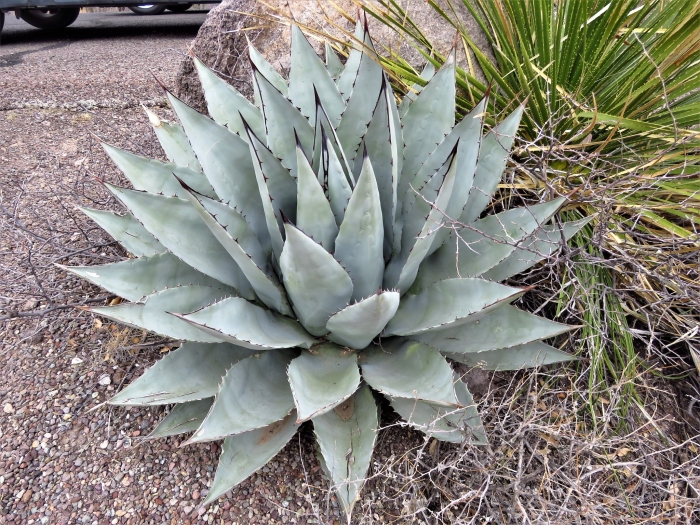Havard Agave
(Agave havardiana)
Havard Agave (Agave havardiana)
/
/

Annika Lindqvist
CC BY 4.0
Image By:
Annika Lindqvist
Recorded By:
Copyright:
CC BY 4.0
Copyright Notice:
Photo by: Annika Lindqvist | License Type: CC BY 4.0 | License URL: http://creativecommons.org/licenses/by/4.0/ | Rights Holder: Annika Lindqvist | Publisher: iNaturalist | Date Created: 2021-04-18T13:13:44-07:00 |






































Estimated Native Range
Summary
Agave havardiana, commonly known as Havard Agave, is an evergreen succulent native to the Chihuahuan Desert, specifically to rocky limestone hillsides and grasslands in West Texas and Northeastern Mexico. This species is acaulescent, meaning it does not have an obvious stem, and forms compact rosettes close to the ground. It occasionally produces offsets, or "suckers," but does not typically form extensive colonies. The blue-green leaves are thick and fleshy, up to 70 cm (28 inches) long, with strong teeth along the margins and a sharp terminal spine. When it blooms, which is typically after 10 years or more, the flowering stalks can reach up to 7 m (23 feet) tall, displaying numerous yellow to yellow-green flowers that are attractive to pollinators in the spring and summer. The fruits are dry capsules, oblong, and up to 6 cm (2.4 inches) long.
Havard Agave is valued for its striking sculptural form and is often used as a focal point in xeriscapes and rock gardens due to its low water requirements and ability to thrive in poor, well-drained soils. It is also suitable for container gardening. While it is drought-tolerant, it is sensitive to overwatering and cold, which can lead to root rot. It requires full sun to develop its best form and color. There are no widely available cultivars due to its slow growth and infrequent flowering. Gardeners should handle with care due to the sharp leaf spines.CC BY-SA 4.0
Havard Agave is valued for its striking sculptural form and is often used as a focal point in xeriscapes and rock gardens due to its low water requirements and ability to thrive in poor, well-drained soils. It is also suitable for container gardening. While it is drought-tolerant, it is sensitive to overwatering and cold, which can lead to root rot. It requires full sun to develop its best form and color. There are no widely available cultivars due to its slow growth and infrequent flowering. Gardeners should handle with care due to the sharp leaf spines.CC BY-SA 4.0
Plant Description
- Plant Type: Succulent
- Height: 2-2.5 feet
- Width: 1-2 feet
- Growth Rate: Slow
- Flower Color: Yellow
- Flowering Season: Summer
- Leaf Retention: Evergreen
Growth Requirements
- Sun: Full Sun
- Water: Very Low
- Drainage: Fast
Common Uses
Bee Garden, Bird Garden, Deer Resistant, Drought Tolerant, Fire Resistant, Fragrant, Hummingbird Garden, Low Maintenance, Rabbit Resistant, Rock Garden, Salt Tolerant, Street Planting
Natural Habitat
Native to rocky limestone hillsides and grasslands in the Chihuahuan Desert
Other Names
Common Names: Havard’s Century Plant, Maguey De Havard
Scientific Names: , Agave havardiana,
GBIF Accepted Name: Agave havardiana Trel.